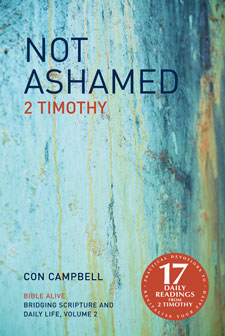Shame is a very powerful emotion. Not everyone can say they have experienced its full effect. Yet those that have will testify to how strong a grip it can have. Its grip is so powerful it takes your inner strength. It crushes your spirit like a heavy weight. And it takes all your might to regain your strength to face the world again.
However, shame is not appropriate when we proudly stand up and expound the Word of God. This is the type of shame Con Campbell's book is guarding us against. In sharing God's word with others we are not to feel shame.
In 1 Peter 4:16 we are reminded:
 "However, if you suffer as a Christian, do not be ashamed, but praise God that you bear that name."
"However, if you suffer as a Christian, do not be ashamed, but praise God that you bear that name."
If non-believers mock us, or persecute us, we should not feel shame. In our daily Christian lives our priority ought to be to please God. We are not to seek the approval of our fellow man, but God's.
Galatians 1:10 reads: "Am I now trying to win the approval of men, or of God? Or am I trying to please men? If I were still trying to please men, I would not be a servant of Christ."
Not Ashamed seeks to encourage the believer to live a life of righteousness. Con Campbell has pulled out themes from 2 Timothy to create 17 daily reflections for use in personal devotions or with a group of Christians wanting to exhort one another to run the good race.
Campbell shares the apostle Paul's teaching that "Christian living begins with the end. It is the glorious end of the race that gives shape to the running of the race".
Here we are reminded that running the race on earth is a journey that holds with it a promise of reward: the reward of eternal life. Keeping our eyes on heaven - the finish line - helps the weary Christian to persevere.
"However, I consider my life worth nothing to me, if only I may finish the race and complete the task the Lord Jesus has given me " the task of testifying to the gospel of God's grace." [Acts 20:24]
Campbell is up-front when he states that his book does not provide a verse by verse analysis. It is not a commentary. Instead the book picks up on themes in 2 Timothy that guide us toward godly living. To illustrate this Following the Truth, Wise for Salvation, The Key to Godliness, Itching Ears and Crown of Righteousness are examples of some of the chapter headings. Each aims to keep Christians walking tall. The book provides a platform on which to stand when choosing to share one's faith from a position of vulnerability with another person.
The book is written in plain English making it accessible to Christians at any stage of their Christian walk. Campbell's mix of anecdotes from his personal life and illustrations from recent newsworthy events make this an enjoyable read. Each chapter ends with a suggested prayer and three or four discussion questions.
No one can make you feel shame. The Macquarie Dictionary defines shame as "the painful feeling arising from the consciousness of something dishonourable, improper, ridiculous, etc done by oneself". We only feel shame when we become aware of what others think of us and their subsequent rejection of us. But when it comes to defending the gospel this is not appropriate.
If we feel ashamed of our faith then we have neglected to make God number one in our lives. If we feel shame then we are caring too much about what our peers think rather than what God thinks.
Campbell sums the book up in his introduction by saying, "The challenge of holding on to the truth " in a world that rejects it " is what this book is about. Holding on to the truth is the challenge for all Christians, whether you're a new Christian or you've been a Christian for fifty years."
And in the conclusion he writes: "But the word of challenge is not the last word. The last word is one of hope and glory, heaven and reward. At the end of it all, Jesus Christ will award us with the crown of righteousness. All believers will enjoy life forever sharing with Jesus. That is what we look forward to. That is our hope. That is what keeps us going."
























